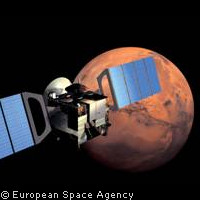Artificial intelligence tackles data transmission from space
Flash back to 1956 where scientists are brainstorming and writing breakthrough programs in the field of Artificial intelligence (AI). Flash forward to 2008 where AI is helping mission planners improve data transmission from the Mars Express spacecraft. Since its inception, AI has been offering exciting solutions to complex problems and its entry into the space mission operations field as a value- added technology is benefiting Europe and the rest of the world. The European Space Agency's (ESA) Mars Express is Europe's first planetary mission. When it was launched in 2003, the mission consisted of an orbiter carrying seven instruments for remote sensing observations of the planet, and a lander called Beagle 2 for on-the-spot measurements of Martian rock and soil. Although the lander failed to land safely on the Martian surface, since early 2004 the orbiter has been successfully performing scientific measurements of the surface, subsurface and atmosphere of Mars. Ultimately, the goal of the Mars mission is to search for water in its various states, everywhere on the planet using all its seven instruments and different techniques. The mission has the capacity to churn out a great deal of scientific data. The challenge, however, is for this information to be downloaded to Earth at the right time and in the correct sequence. Failure to do so will result in the permanent loss of data packets because the newly collected data will overwrite the limited on-board memory. The conventional method of downloading data involves the use of human-operated scheduling software to produce command sequences sent to Mars Express. This process informs the system when to unload specific data packets. 'This is tedious, time-consuming and never really eliminated the occasional loss - forever - of valuable science data,' explained Alessandro Donati, Head of the Advanced Mission Concepts and Technologies Office at ESA's Space Operations Centre (ESOC), Darmstadt, Germany. Because of number of constantly changing variables, such as ground station availability, spacecraft orientation, and varying amounts of data generated by each of the seven on-board instruments, scheduling problems in the downloading process can occur, explains Mr Donati. Consequently, the variables must be optimised quickly, 'with as little as a few hours between ground station passes'. These problems prompted researchers at the Italian-based Institute for Cognitive Science and Technology (ISTC-CNR) and mission planners and computer scientists at ESOC to apply AI techniques to the downloading process. Shipping and airline companies already use similar techniques to deal with their scheduling woes. Together, the team came up with a smart tool called 'MEXAR2 (Mars Express AI Tool). 'With MEXAR2, any loss of stored data packets has been largely eliminated,' said Fred Jansen, ESA's mission manager for Mars Express. MEXAR2 weighs up the variables affecting the downloading process and then 'intelligently' projects which on-board data packets might be later lost due to memory conflicts. Once this is completed, MEXAR2 then optimises the data download schedule and generates the commands that launch the download. Initial testing and validation of the MEXAR2 have been successful, and the smart tool is already being used in the Mars Express missing planning system where it has helped to reduce the workload of the planning team by 50%. 'And because it optimises bandwidth used to receive data on Earth, we have been able to free expensive ground station time for other missions,' notes ESOC's Mars Express Spacecraft Operations Manager Michel Denis. 'During MEXAR2's development, the flexibility of AI-based technology let us capture many specific requirements that would otherwise have needed costly software specification redesign,' adds ESOC's AI research fellow Nicola Policella. The merits of MEXAR2 have been widely acknowledged. In addition to receiving the 'best application' award at ICAPS 2007, the premier forum for AI planning and scheduling technology, MEXAR2 has received rave reviews for being one of only three AI applications available for space mission operations. 'MEXAR2 is a trailblazer in bringing AI technology to spacecraft operations,' believes Dr Ari Kristinn Jónsson, Dean of the School of Computer Science at Reykjavik University, Iceland, and a former research scientist at NASA's Ames Research.



